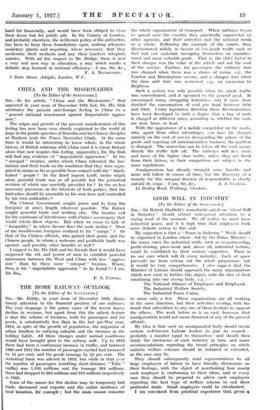THE HOME RAILWAY OUTLOOK
[To the Editor of the SPECTATOR.] SIR,—Mr. Kiddy, in your issue of December 18th, draws timely attention to the financial position of our railways. The coal stoppage is the prime cause of the recent heavy decline in revenue, but apart from this the salient feature is that the volume of business, both for passengers and for goods, is substantially less than in the last pre-War year, 1913, in spite of the growth of population, the migration of urban dwellers to outlying suburbs and the increase in the holiday habit. All these changes under normal conditions would have brought grist to the railway mill. Up to 1913 there had been a continuous increase in traffic, and between 1900 and 1912 the number of passengers carried had increased by 12 per cent. and the goods tonnage by 22 per cent. The statistical basis was altered in 1913, but while in that year the number of passengers (omitting short-distance " Tube " traffic) was 1,103 millions and the tonnage 364 millions, these had dropped to 985 millions and 316 millions respectively in 1925.
Some of the causes for this decline may be temporary bad trade, decreased coal exports and the unfair incidence of local taxation, for example ; but the main reason concerns
the whole organization of transport. When railways began to spread over the country they practically superseded all other agencies, and their activities met the national needs as a whole. Following the example of the canals, they discriminated widely in favour of low-grade traffic such as fuel and raw material, recouping themselves on manufac- tured and more valuable goods. That is, the chief factor in their charges was the value of the article and not the cost of the service. Further, for passengers the ordinary fare was charged when there was a choice of trains, e.g., the London and Birmingham service, and a cheaper fare when the time and date was restricted, e.g., an excursion to Brighton.
Such a system was only possible when the whole traffic was, concentrated, and it operated to the general good. It encouraged many struggling industries, and it more than doubled the consumption of coal per head between 1850 and 1900. Under legislative direction these discriminations have been developed to such a degree that a bag of nails is charged at different rates, according to whether the nails are iron, brass or lead.
With the appearance of a mobile competitor on the roads, who, apart from other advantiges, can base his charges entirely on the cost of service disregarding the nature of the goods and rejecting all unrcmunerative business, the position is changed. The motor-bus can be taken off the road imme- diately the traffic falls off. The railways will lose more and more of the higher class traffic, unless they are freed from their fetters, or their competitors are subject to the same regulations.
Amalgamation has already wrought some benefits and more will follow in course of time, but the discovery of a remedy for this unequal division of responsibility is clearly
outside its scope.—I am, Sir, &e., J. J. CLARKE. 12 Radley Road, Wallasey, Cheshire.


































 Previous page
Previous page